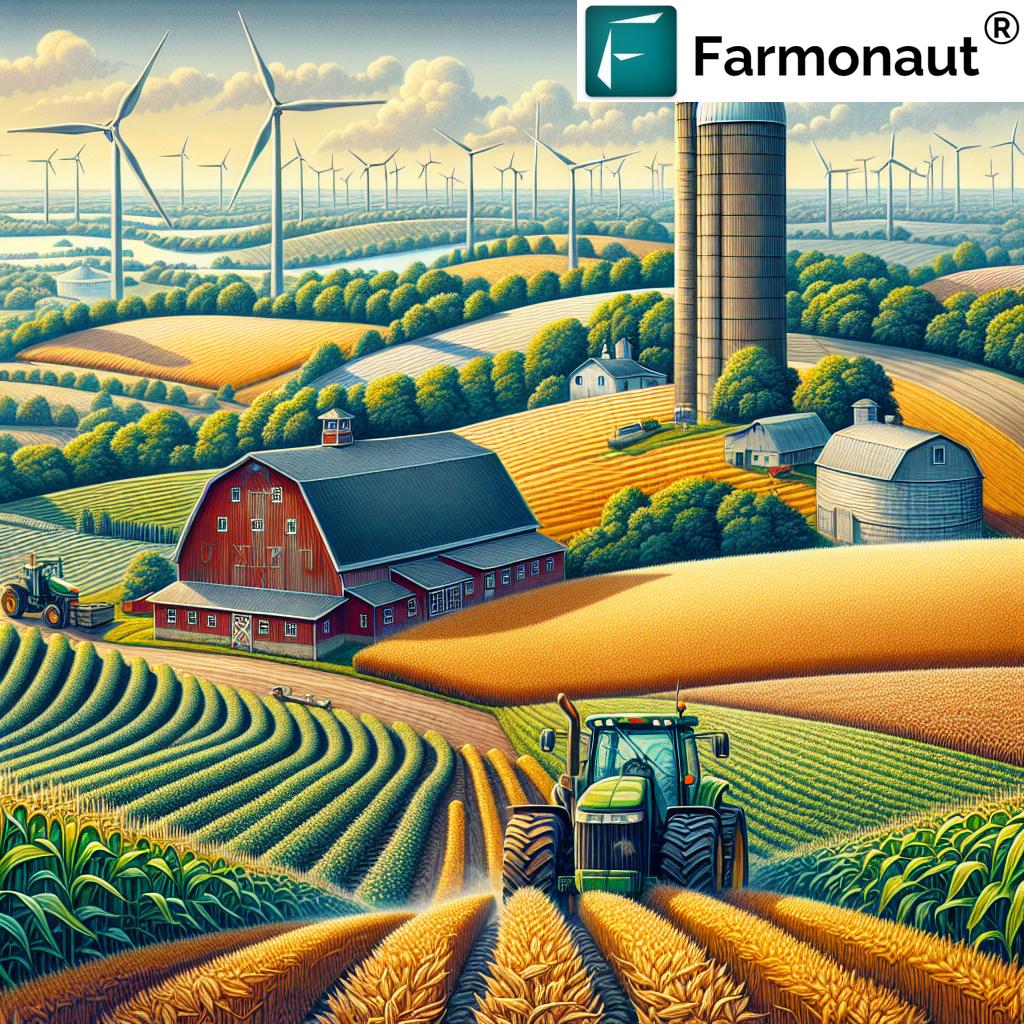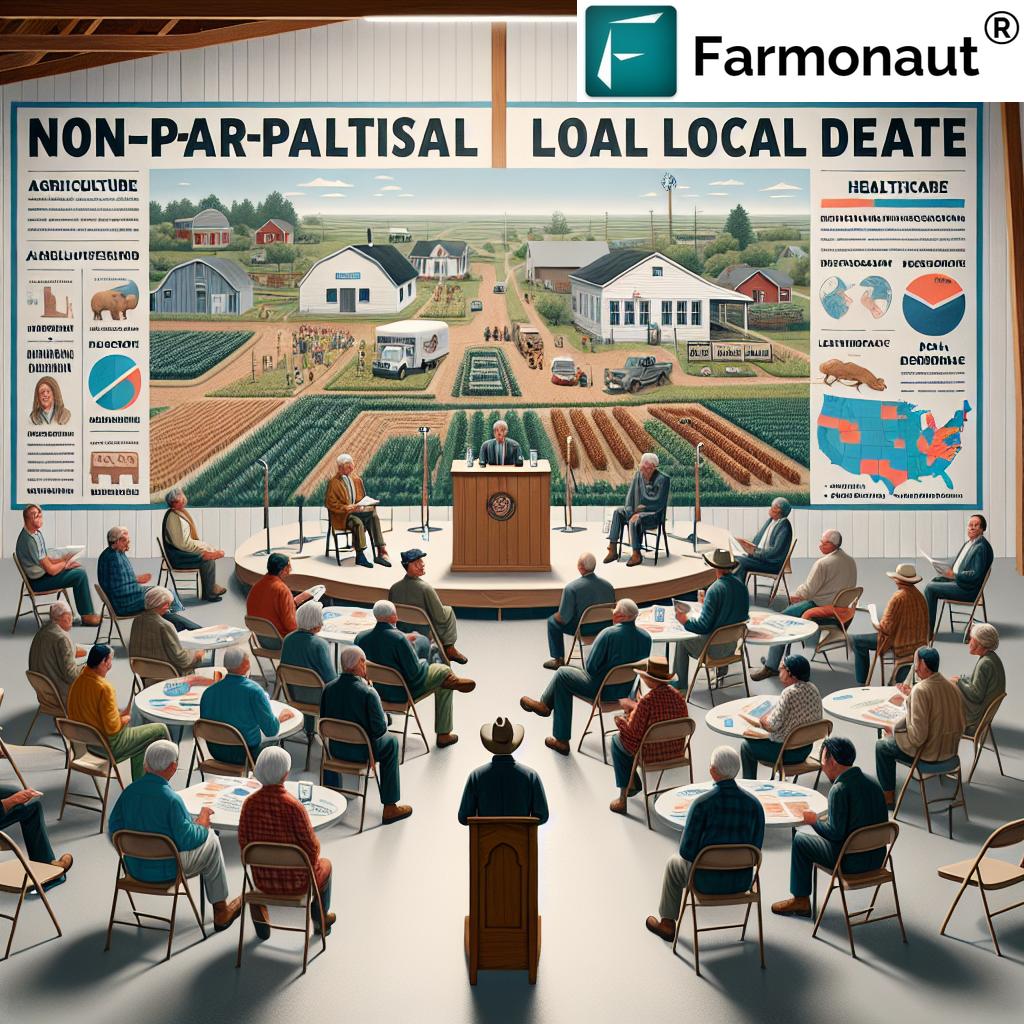Rural Ontario Election Debate: Candidates Address Agriculture, Healthcare, and Infrastructure in Renfrew-Nipissing-Pembroke
“Ontario’s rural debate addressed 4 key areas: agriculture, healthcare, education, and infrastructure, highlighting diverse rural challenges.”
We recently witnessed a pivotal moment in rural Ontario’s political landscape as MPP candidates gathered for an election debate in Renfrew-Nipissing-Pembroke. This event put a spotlight on critical issues facing farmers and rural communities, offering valuable insights into the future of Ontario’s agricultural sector and rural development.
Despite challenging weather conditions, about 80 dedicated citizens braved a winter storm to hear candidates discuss pressing matters such as agriculture, healthcare, education, and infrastructure. The debate provided a unique opportunity for voters to engage directly with those vying to represent their interests in Queen’s Park.

Setting the Stage: Candidates and Key Issues
The debate featured three candidates: NDP’s Marshall Buchanan, Ontario Party’s Kevin Holm, and Liberal’s Oliver Jacob. Notably absent were representatives from the Progressive Conservative, New Blue, and Green parties. This absence did not go unnoticed, with candidates and attendees alike commenting on the empty chairs at the debate table.
Throughout the evening, candidates addressed a wide range of topics crucial to rural Ontario’s future:
- Agricultural sustainability and farmland protection
- Healthcare access and improvements
- Education funding and rural school support
- Infrastructure development, including transportation and internet connectivity
- Renewable energy initiatives
- Strategies to attract young farmers and address labor shortages
Agriculture: The Heart of Rural Ontario
Agriculture took center stage in the debate, reflecting its paramount importance to the region’s economy and identity. Candidates discussed various strategies to address the challenges facing Ontario’s farming community.
Protecting Farmland and Promoting Sustainable Practices
A critical issue raised during the debate was the alarming rate of farmland loss in Ontario. Candidates were asked how they would balance growth with protecting this precious resource.
- NDP candidate Buchanan emphasized the need for denser urban development to preserve farmland, stating, “Farmland is going to become the new gold.”
- Liberal candidate Jacob called for changes to the Provincial Policy Statement to better protect prime agricultural land from development.
- Ontario Party candidate Holm proposed stronger land use zoning regulations and incentives for urban agriculture.
These proposals highlight the growing recognition of farmland as a finite and invaluable resource for Ontario’s future.
Addressing the Aging Farmer Population
“The aging agricultural workforce in Ontario prompts candidates to discuss strategies for attracting young farmers to the sector.”
With the average age of farmers in Ontario now at 57, candidates offered various solutions to attract and retain young people in agriculture:
- Tax benefits and wage subsidies for young farmers
- Mentorship programs pairing youth with experienced farmers
- Improved succession planning support
- Integration of agricultural education in schools
These proposals aim to ensure the continuity and vitality of Ontario’s agricultural sector for generations to come.
Healthcare: Ensuring Access in Rural Communities
Access to timely and quality healthcare emerged as a critical concern for rural Ontario residents. Candidates acknowledged the challenges faced by rural communities and proposed various solutions:
- Supporting and expanding the Renfrew County Virtual Triage and Assessment Centre (RCVTAC)
- Investing in healthcare infrastructure and support staff for doctor clinics
- Expanding paramedicine programs for in-home care
- Exploring private supplementary insurance options
The debate highlighted the urgent need for innovative approaches to healthcare delivery in rural areas, where one in four residents currently lack a family doctor.
Education: Nurturing Rural Ontario’s Future
Education funding and access were hot topics during the debate. Candidates recognized the unique challenges faced by rural schools and proposed several strategies to improve educational outcomes:
- Increased funding for small rural schools
- Fair compensation for school bus drivers to ensure reliable transportation
- Focus on core subjects and critical thinking skills
- Support for students with special needs
- Integration of agricultural education to promote farming careers
These proposals aim to create a more robust and accessible education system that serves the specific needs of rural communities.

Infrastructure: Building the Foundation for Rural Growth
Infrastructure development emerged as a crucial topic, with candidates recognizing its role in supporting rural economic growth and quality of life. Key points of discussion included:
- Expansion of high-speed internet access, including support for services like Starlink
- Completion of the Highway 417 four-laning project to improve safety and connectivity
- Investment in renewable energy infrastructure, including solar and biomass options
- Support for small modular reactor research at Chalk River
These infrastructure initiatives aim to bridge the gap between rural and urban Ontario, creating new opportunities for growth and development in rural communities.
Renewable Energy and Natural Resources
The debate also touched on the important topic of renewable energy and natural resource management in rural Ontario. Candidates offered diverse perspectives on balancing energy needs with environmental concerns:
- Promoting energy from biomass and exploring small modular nuclear reactors
- Cautioning against large-scale solar farms on prime agricultural land
- Emphasizing community involvement in renewable energy projects
- Focusing on energy efficiency and grid sustainability
These discussions highlight the complex interplay between agricultural interests, environmental sustainability, and energy needs in rural Ontario.
Economic Opportunities Beyond Agriculture
While agriculture remains a cornerstone of rural Ontario’s economy, candidates also discussed opportunities for diversification and growth in other sectors:
- Investment in food processing infrastructure, such as poultry slaughterhouses
- Promotion of agritourism to bring visitors to farms
- Creation of a business-friendly environment through tax benefits and reduced red tape
- Support for tuition reduction in high-demand career programs
These proposals aim to create a more resilient and diverse rural economy that can weather challenges and provide opportunities for future generations.
Comparison of Candidates’ Positions
| Issue | NDP (Marshall Buchanan) | Ontario Party (Kevin Holm) | Liberal (Oliver Jacob) |
|---|---|---|---|
| Agriculture |
• Promote careers in farming • Fund agricultural college programs • Support succession planning |
• Provide tax benefits and wage subsidies • Lower farm property tax rates • Offer incentives for agricultural careers |
• Introduce agriculture sector in schools • Promote buying local • Ease farm succession between generations |
| Healthcare |
• Support doctor clinics with funding for support staff • Expand paramedicine program |
• Maintain RCVTAC • Allow private supplementary insurance |
• Continue support for RCVTAC • Invest in healthcare infrastructure |
| Education |
• Increase student funding • Support post-secondary education |
• Fair compensation for bus drivers • Focus on core skills and subjects |
• Provide supports for teachers and staff • Focus on critical thinking and problem-solving |
| Infrastructure |
• Progress on Highway 417 four-laning • Promote renewable energy (solar, biomass) |
• Keep Starlink for internet access • Eliminate provincial carbon tax |
• Complete Highway 17 four-laning • Address increasing hydro transmission costs |
The Role of Technology in Rural Development
As we consider the future of rural Ontario, it’s important to highlight the role that technology can play in addressing many of the challenges discussed during the debate. Advanced agricultural technologies, such as those offered by Farmonaut, have the potential to revolutionize farming practices and support the goals outlined by the candidates.
Farmonaut’s satellite-based farm management solutions provide valuable tools for farmers, including:
- Real-time crop health monitoring
- AI-based advisory systems
- Resource management tools
- Blockchain-based traceability for supply chains
These technologies align with many of the goals discussed in the debate, such as attracting young farmers, promoting sustainable practices, and enhancing agricultural productivity.
Explore Farmonaut’s solutions:
For developers interested in integrating agricultural data into their own systems, Farmonaut also offers an API. Learn more in the API Developer Docs.
Conclusion: A Vision for Rural Ontario’s Future
The Renfrew-Nipissing-Pembroke election debate provided a comprehensive look at the challenges and opportunities facing rural Ontario. From agriculture and healthcare to education and infrastructure, the candidates offered diverse perspectives on how to build a stronger, more resilient rural economy.
Key takeaways from the debate include:
- The urgent need to protect farmland and support sustainable agricultural practices
- The importance of attracting young farmers and addressing labor shortages in the agricultural sector
- The critical role of healthcare access and education in maintaining vibrant rural communities
- The potential for infrastructure improvements and renewable energy to drive rural economic growth
As rural Ontario looks to the future, it’s clear that innovative solutions and technologies will play a crucial role in addressing these challenges. By embracing new approaches to agriculture, healthcare, and community development, rural Ontario can build a strong foundation for generations to come.
FAQ Section
- Q: What were the main issues addressed in the Renfrew-Nipissing-Pembroke election debate?
A: The debate focused on agriculture, healthcare, education, and infrastructure in rural Ontario. - Q: How did candidates propose to address the aging farmer population?
A: Proposals included tax benefits, mentorship programs, improved succession planning, and integrating agricultural education in schools. - Q: What solutions were suggested for improving healthcare access in rural areas?
A: Candidates proposed expanding virtual care services, investing in healthcare infrastructure, and exploring private supplementary insurance options. - Q: How did candidates address the issue of farmland protection?
A: Suggestions included promoting denser urban development, changing land use regulations, and offering incentives for urban agriculture. - Q: What infrastructure improvements were proposed for rural Ontario?
A: Candidates discussed expanding high-speed internet access, completing highway projects, and investing in renewable energy infrastructure.
Earn With Farmonaut: Affiliate Program
Earn 20% recurring commission with Farmonaut’s affiliate program by sharing your promo code and helping farmers save 10%. Onboard 10 Elite farmers monthly to earn a minimum of $148,000 annually—start now and grow your income!
Farmonaut Subscriptions







